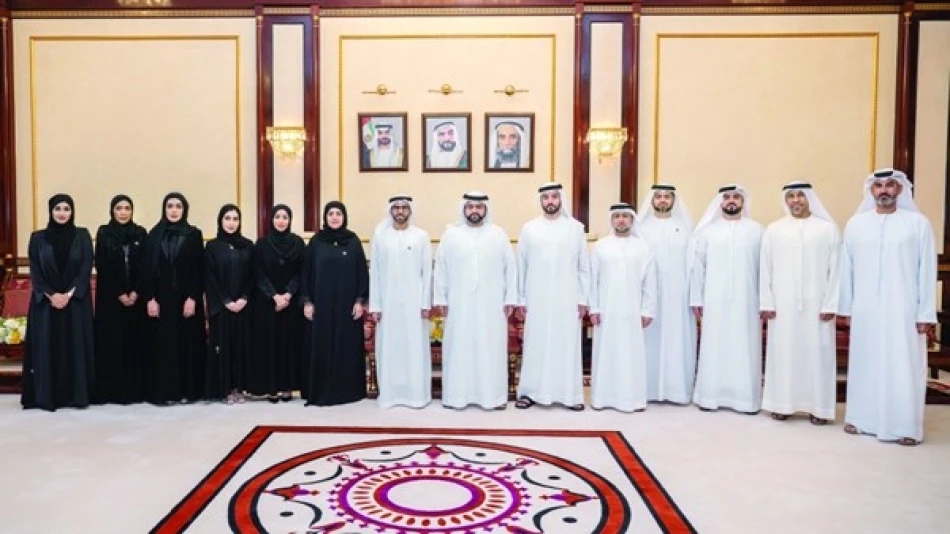
Empowering National Talents: Investing in Innovative Minds with Mohammed Al Sharqi
UAE Doubles Down on Homegrown Leadership as Regional Competition for Talent Intensifies
The UAE is accelerating efforts to cultivate domestic leadership talent through strategic government programs, as regional rivals like Saudi Arabia and Qatar ramp up their own human capital initiatives. Sheikh Mohammed bin Hamad Al Sharqi, Crown Prince of Fujairah, recently emphasized the critical importance of empowering national cadres during a high-level meeting with participants of the "UAE Government Leaders 2025" program, signaling the country's commitment to reducing dependence on foreign expertise in key sectors.
Strategic Imperative Behind Leadership Development
During the meeting at Al Rumaila Palace, Crown Prince Al Sharqi highlighted the government's focus on investing in creative minds among Emirati nationals to lead the country toward future achievements across all sectors. This emphasis comes at a time when the UAE faces increasing competition from neighboring Gulf states, all vying to attract and retain top talent in preparation for post-oil economies.
The Crown Prince's remarks reflect a broader recognition that sustainable development requires homegrown leadership capabilities rather than continued reliance on expatriate management, which has historically dominated the UAE's private and public sectors.
Program Structure and Market Implications
Elite Talent Pipeline
The UAE Government Leaders program currently involves 15 carefully selected national talents from federal and local government entities, as well as the private sector. This selective approach mirrors Singapore's elite civil service development programs, which have proven successful in creating policy continuity and institutional knowledge.
The program operates under the motto "UAE is Our School," emphasizing practical, locally-relevant leadership development rather than generic international management training.
Direct Access to Decision Makers
A key differentiator of the UAE's approach is providing program participants with direct access to senior leadership and decision-makers. This creates immediate networking opportunities and ensures that emerging leaders understand current policy directions and strategic priorities firsthand.
Regional Context and Competitive Dynamics
The UAE's leadership development push occurs against the backdrop of Vision 2071, which aims to make the country the world's best nation by its centennial. However, the UAE isn't alone in this ambition. Saudi Arabia's Vision 2030 includes similar human capital development goals, while Qatar continues investing heavily in education and leadership programs post-World Cup.
This regional competition for talent development has significant implications for multinational corporations operating in the Gulf. Companies may find themselves dealing with increasingly sophisticated local leadership, potentially reducing their ability to maintain expatriate-heavy management structures.
Economic and Investment Implications
For international investors and businesses, the UAE's emphasis on national leadership development signals several important trends. First, Emiratization policies are likely to become more sophisticated, moving beyond simple quota systems to focus on leadership and decision-making roles.
Second, the development of domestic expertise could reduce the UAE's dependence on foreign consultancy and management services, potentially impacting international service providers who have traditionally filled these gaps.
Long-term Strategic Positioning
The Crown Prince's emphasis on "national responsibility" and service across all sectors suggests the UAE is preparing for a more self-reliant future. This aligns with global trends toward economic nationalism and reduced dependence on foreign expertise in strategic sectors.
The program's focus on connecting emerging leaders with comprehensive development transformations in Fujairah specifically indicates that even smaller emirates are being positioned as laboratories for innovation and governance excellence, rather than simply following Dubai and Abu Dhabi's lead.
As the UAE approaches its next phase of development, the success of programs like UAE Government Leaders 2025 will likely determine whether the country can maintain its competitive edge while building genuine institutional capacity among its national population.
Most Viewed News

 Layla Al Mansoori
Layla Al Mansoori






